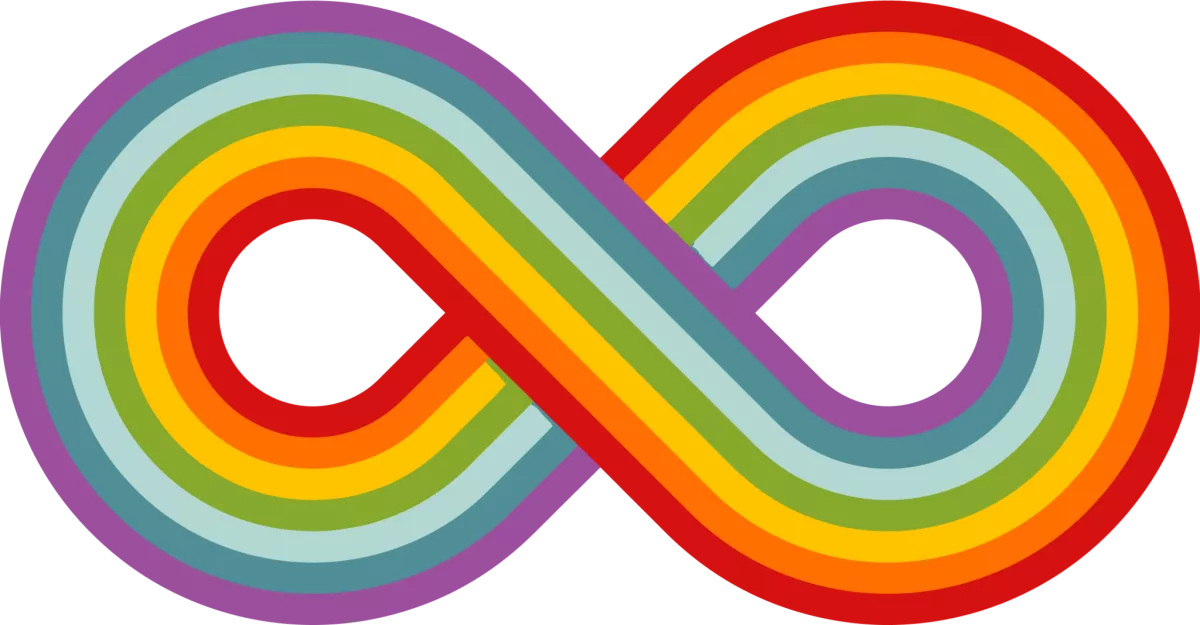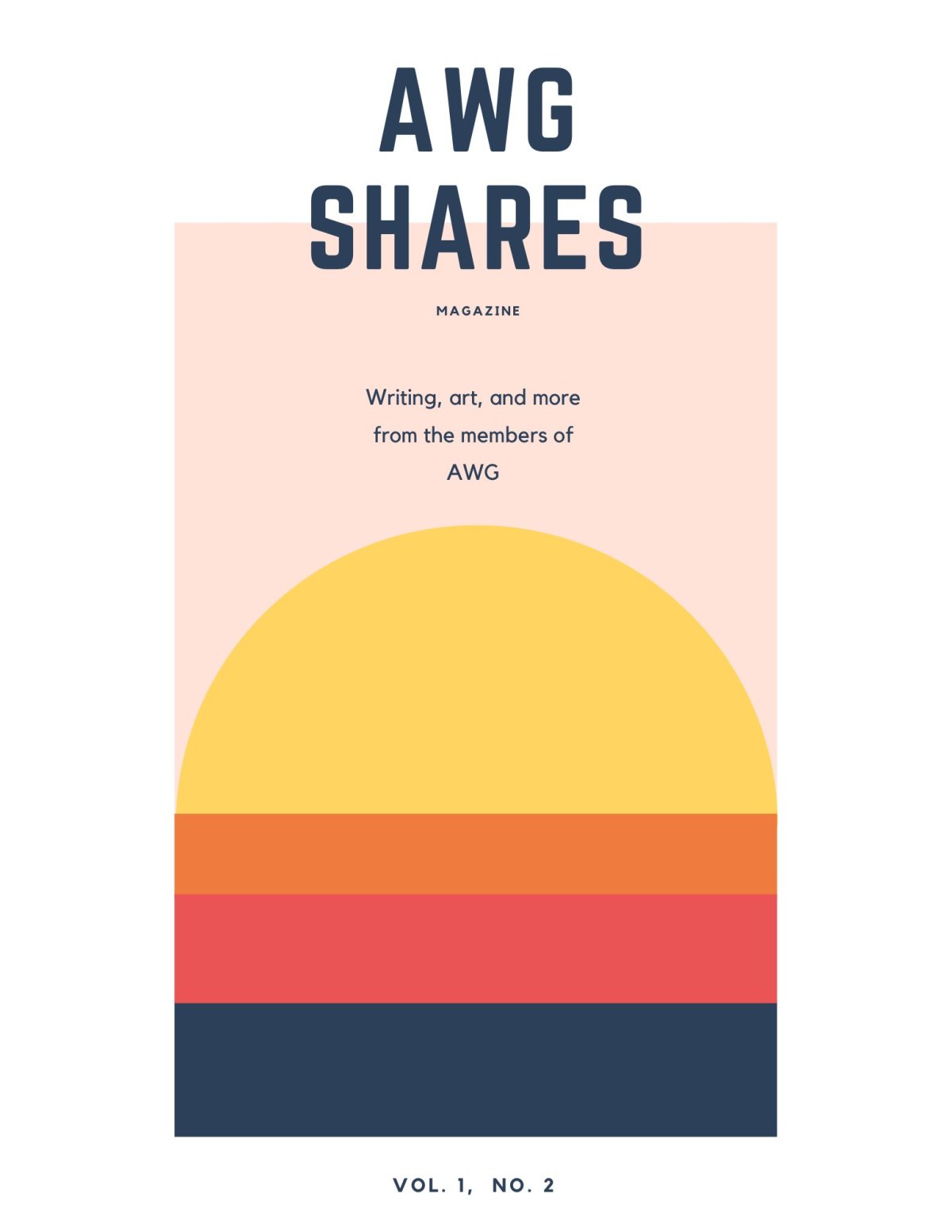
Contents
June 2025 • Vol. 1, Nr. 2
Cover
Elissa Fox
About Autistic Women's Group
Annie Mydla
Audio Art
Thunderbird • Alëna Korolëva
Essay
Trigger warning: Depression
Essay
From Addiction to Awareness – My Neurodivergent Mind • Vanessa Redwing
Essay
Fiction
Hide Your People, Chapter 1: Raid • Ames Blankley
Trigger warning: Painful overwhelm, distress of an autistic woman pre-identification, and violence and bigotry against neurodivergent people
Getting to Know
Studio 606 • Val Flynn
Snippets of Autistic Life
Neuropsych Testing • Andrea
Comics
Bathrobe Comics: Bathrooms • Sarah Jane Cody
Sticker
Feel Your Feelings • Elissa Fox
About Autistic Women's Group
Established 2021
AWG is an online support group where late-identified autistic women and other members of marginalized genders share on their personal experiences with autism. The meeting format is designed to reduce the sensory, social, and executive function burdens that normally come with socializing. Our members are clinically-diagnosed, self-diagnosed, and questioning. AWG is volunteer-led and not associated with any other umbrella organization or company.
Please consider joining us on Zoom. Our member profile is inclusive. Meetings are always free and no registration is required. Members share by speaking or typing. We also have many members who come just to listen. You never have to turn on you mic or camera if you don't want to. You don't have to come to every meeting, or stay the whole meeting, in order to be a full member. Disclosure of diagnosis/gender identity is welcome but never required for participation.
You can also...
- See upcoming meeting topics
- Sign up for meeting reminders (scroll the homepage to find the signup form)
- Join the AWG subreddit
AWG Shares Magazine was established in 2025. Anyone who fits our membership profile is encouraged to submit their work. There are no rejections. Read our submission guidelines here.
Would you like to advertise? We don't sell ads, but we are open to cross-promotion partnerships. Contact awg@autisticwomensgroup.com or use our contact form to discuss.
I hope you enjoy AWG Shares Magazine. And please do join us in a meeting sometime if you can.
Annie Mydla
Founder and facilitator, AWG
Audio Art:
Thunderbird
Alëna Korolëva
From Accidental Wilderness
This album of field recording-based compositions grew from listening to the sounds of the ever-changing boundary between the city of Toronto and Lake Ontario. The waterfront is a transition zone where sounds of animals, plants, people, machines and water meet and overlap.
The album’s title refers to the transformation of a wasteland into new natural habitats. This happened in Toronto as wildlife reclaimed islands of construction garbage which had been dumped into the lake. Over the years the site became a lush green park, a home and meeting place for many different species.
CD + Digital Album, 2022
The album’s title refers to the transformation of a wasteland into new natural habitats. This happened in Toronto as wildlife reclaimed islands of construction garbage which had been dumped into the lake. Over the years the site became a lush green park, a home and meeting place for many different species.
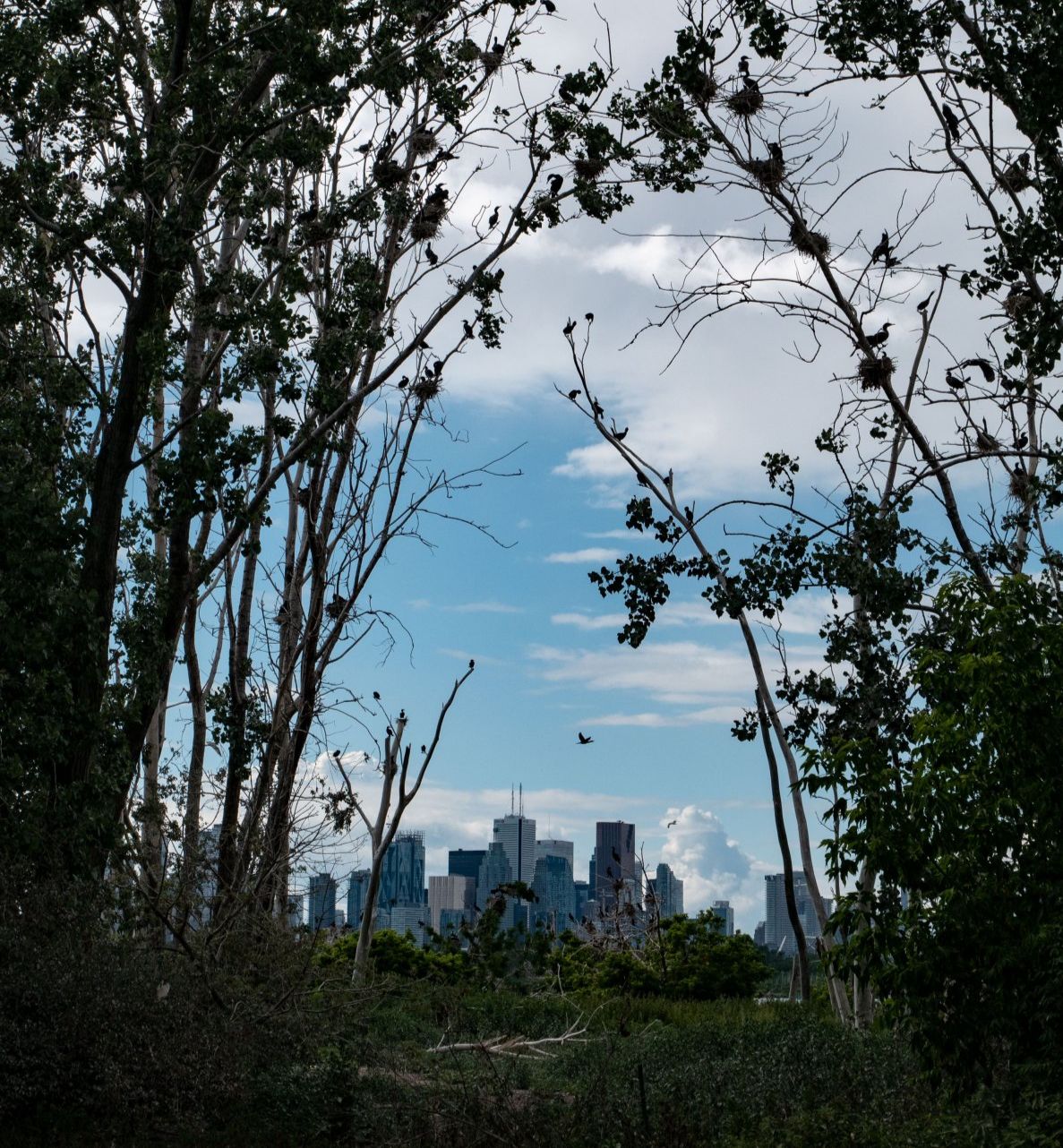
Walking the Line — For Struggling Autistic People
Trigger warning: Depression
"Poetry is not a luxury. It is a vital necessity of our existence (...) Poetry is the way we help give name to the nameless so it can be thought." (Audre Lorde, Poetry Is Not A Luxury).
So maybe you’re autistic.
You feel like you don’t belong here. You have tried and tried and tried, and it didn’t work.
You have been failed by the world. You have found yourself in a cruel position — forced to be who you can’t be in order to live. “Home” has always been a paradox.
You have lost opportunities, relationships, jobs, and friendships. It all happened too fast. Some things stayed. You have watched others have fun while you got hurt trying to reach them through invisible walls. You have cursed society, the gods, yourself. You have pushed through the unimaginable. You have been spectacular, and so have your falls. They cannot imagine.
You have looked in the mirror and seen someone else. You have wondered what you are doing here and whether you are here at all.
You have lived with the strange experience of an anomalous brain — unexplainable perceptions, your body an uncharted territory. Like a reluctant explorer of possibilities, you have had to translate worlds in your mind. You have been the outlier.
You have lived in the shadow of clinical definitions that fit you like bad shoes, too narrow, too cold, so serious that it became banal. You never had a name. Their gaze made you allergic to condescension.
You have questioned what nobody was questioning. You have been confused as to why lies hold so much power in a world that could be different. You have gone through Russian dolls of perspectives looking for truth, a frantic attempt to find a valid reason, until the attempt and the reason became one.
You have watched light change, immersed yourself into music like a magic diver, you have found immense enjoyment in niche activities. Repetition is the glue that holds things together. Others don’t understand. The trees and the moon have watched over you. You mostly went unnoticed.
You did not have the luxury of having companions. You took your stubborn route, excluded from the rest. You knew you were not invited. It was made known. You walked far from the established path. You didn’t want it anyway. You wanted it, but not like that.
You have collected rocks, important things, ideas, and intentions. You have dissected it like a scientist. The answer will bring you home. You are an expert on odd things.
You are a hypersensitive creature that was mistaken for a feelingless one. In the shadow of that misunderstanding, your pain grew like moss. A ‘normal’ life is an unreachable shelf of the cosmos. You found it cruel, but you could not find the words, so you kept it all in. You looked for answers to invisible questions.
You have ecosystems in your mind — endless deserts, ripe jungles, sober hills for the silent days, merciless tornadoes and explosive volcanoes, rhythmic oceans, peaks and valleys, and a rarefied atmosphere. You have wondered, what is it? Is the world too much, not enough? Is your brain really the cratered moon of a neurotypical sun? Are you as mysterious as they love to describe you as? Is your personhood contained in a checklist? Are you a freak of nature? What of your existence? What of your difference? What of your energy? What of your love?
You are autistic. You are fighting a dragon. It keeps you stuck on the ground, claws piercing your soul, causing devastating pain, fire burning through your veins, it shakes you left and right with no care, you know it will kill you. You know the magnitude of it. The world around you has collapsed. Your compass is broken. You have fallen somewhere. They cannot imagine.
You have reached out. You have told them, you have tried to explain, you have asked for their help, made them the gift of your trust in spite of the past. And they have failed you, again. You can’t believe they left you there. You can’t believe the world is letting you die like this.
You have been forced to hide who you are, and now you are punished for it. That is unfair. You have been defined by your deficits, but you are now denied the help. That is unfair. You have paid for sins with no name, the looks made you invisible, the mask made you known, the world is upside down, and you can’t put it back.
Every day, you rise to do it again. You wake up late, look the dragon in the eyes — the most intense of all eye contacts, and yet the only one you have learnt to sustain. It stares back at you. A reminder of your freedom, your fear, your loneliness, your ambition, your courage. Your courage to bear its gaze, like a black sun as you go about your day.
You don’t see a way out. In a room with no windows, you have learnt to craft the sun from scratch. A recipe heard from word of mouth somewhere, or maybe the mouth was your own. Not sure. You do that for breakfast. You no longer ask for guarantees. You make concoctions of faith to drink on an empty stomach. You wonder if it’s supposed to taste that bitter. You wonder about balance, if there is merit in accepting defeat.
Yet you haven’t made up your mind yet. In the aftermath of a meltdown, you collect pieces of yourself like the survivor of a solitary hurricane. Put them back. You take care of your own island. You cook the chicken. You play some game. You hold on to the mast of the ship against the winds, and you water the plants. You find some things funny, still. You have failed a million times before, but you still try. Just in case.
There is no romanticism in the abyss. Just the awareness that others have been in it, and have seen another side. There is no inspiration in autistic people’s suffering. I can’t hide the truth. Our lives don’t matter to this system. The anger of this fact cannot go unacknowledged.
To quote Black poet Audre Lorde, “for to survive in the mouth of this dragon we call america, we have had to learn this first and most vital lesson — that we were never meant to survive. Not as human beings.”
The dragon is not only in so-called america. It is global and cellular. It is planetary yet personal. Our lives are not productive. Our need for help is not acceptable. The dragons of your mind and the dragons of this late colonial era have forged an alliance. That is not a lie.
But you are autistic, and you are cosmic. You are not feelingless — that is a lie. You just went unacknowledged. If you don’t know how to exist in this world, don’t jump just yet. Walk on the line. Hold both life and death by the hand, if you have to. See where the line brings you. We exist.
From Addiction to Awareness: My Neurodivergent Mind
Vanessa Redwing
The Disease of More
Neuroscience of My Desire
Rejection Sensitivity and Abandonment
Crossing the Line into Addiction
Discernment Through Spirituality
There’s a term that I’ve become quite accustomed to, as it does describe my life pretty well. It is “the disease of more” aka addiction. The idea, or more so, the feeling that when I get something I want more of it. Some people might call this an addictive personality. Everyone is familiar with that feeling, I believe. Particularly if you are in recovery from addiction yourself. Then you might relate to this term to your very core.
The first time I heard this statement I determined it accurately defined the way I feel about absolutely anything that feels good. When I get that first bite of chocolate, it touches my tongue and melts into my mouth. The instantaneous thought darts into my mind, can I have another, before it's even gone. Next, would it be acceptable for me to eat the entire bag or box? Whether or not that is a pound of Chocolates or an entire cake. The images fly through my mind, can I get away with it?! I rarely act on the thoughts anymore, but they are there.
Of course, in active addiction, I was ravenous. There was never enough of whatever it was I wanted. This simply defined my life. The constant acquisition of things, substances and people. I suppose that is the epitome of addiction, a life ruled by desires and an unending drive to obtain more.
The same feeling and physiological responses used to happen when something felt good emotionally. I wanted to hang onto it. A deep resonance that I did not want positive experiences to end. Ever. It would register to me that something enjoyable was happening. Inside I felt I’ve worked out the circumstances to arrive at this moment and I want to remain inside of it. I can recall in reflection times when the world outside an enjoyable experience melted away, became nonexistent. I lost myself. Deeply wishing to never return.
At that time I was undiagnosed autistic and the importance of the substance solution was yet unknown to me. I did not realize how much my nervous system desperately needed a break from all the inputs. In hindsight it is no wonder I needed respite via numbing for all those years. I was self-medicating unknowingly. So yes, I necessarily did not want my safety bubble removed, the band-aid ripped off only to return to full on overload.
When I was drinking I would never want an evening to end. I was finally in a snow globe of fantasy. Blissfully blurred. The mind quieter, thoughts slowed to a drawl. The nagging irritations of simply existing were tolerable. I was notorious for always being the 'Last Man Standing'. There was the period of many years, where this happened every night, when everyone else had drank their fill, and I was alone. Every party always ended with me spending a significant amount of time drinking alone. Because nobody wanted to have an endless night. Nobody but me in my peaceful, isolated solitude.
In those decades of alcohol abuse I also was famous for not letting people leave. My closest friends knew that they would have to give me an hour warning before leaving otherwise I was incredibly let down. Deeply sad and rejected that things were coming to a close. Reality won over my accomplice's desire for sleepless dedication to me.
This eventually ran away like a train. I got to the point where I would jump parties and social scenes. When one situation ended, I found new people to be with. Let’s say an innocent gathering for happy hour came to a close, a reasonable two or three hours after it began. Often those people didn’t want to stay out and as regular people do, that first round of friends would go home. I would go to the next thing which was often by myself and meant going out for late night. I may or may not know the people that were going out since the friend group has already gone home. So often, I was alone. Once again, the evening attempted to get one over on me and the bars would close. However, there was always at least one person that wanted to stay up for after hours. Here I would find myself 10 to 12 hours later drunk, alone with people I didn’t know and in places I was unfamiliar with most times.
I never wanted a situation that had become good and comfortable to end. In light of my recent late diagnoses, including autism, ADHD and Rejection Sensitive Dysphoria (RSD). I now realize that it was likely because I had navigated that particular social situation ‘well’. I had done all that hard work and did not want to have to restart it another time. So unrealistically I will try to force it to continue. As if I could remain every night in the space where the world was softer and fuzzy. Inside the white noise of static, I finally felt safe. Not because I was safe, but because my inhibitions were obliterated.
The RSD may explain why it felt painful when the one or two people I actually enjoyed being with wanted to leave. Putting incredible pressure on them. It was for this reason that for periods of my life I had only one close, dedicated and constant friend. We had a system, rejection was low. I was safe. The only problem being that person had to have similar ambitions as mine. Meaning, we were devoted drinking partners.
The solution of more has also been misconstrued by me. I find it to be one of several deep roots of my addiction. In my mind if one drink will take the edge off in such a profound way, then 10 drinks would be fantastic. But it just doesn’t work that way. The same thing applies to any kind of substance that “worked" for me. I always thought that because the shift was so big with the ingestion that continuing to take more would make it better.
I kissed a bee accidentally one summer many years ago and I got stung on my lip. My father-in-law gave me ibuprofen. I took three because the recommendation was two. I thought an extra one would make it better. I remember he turned to me and said, it doesn’t really work like that. I remember being perplexed. But in my mind, everything would work that way, wouldn’t it? It seems logical to me.
For quite a number of years the continued input of more substances did address my main problem: dealing with the intolerance of a neurotypical world for an undiagnosed neurodivergent girl. This is one of the perplexities of addiction. It is almost always a solution for the sufferer. At first. The devastating result however is that the underlying condition, whether it be trauma, PTSD or autism, is not healed, it is just placated. Plus, now you are an addict.
I have extended this idea into all relationships subconsciously. I have sought out that delicious feeling of falling into infatuation. That feeling when you start to get to know somebody. When the shift begins and there’s that excitement. I never want that to end. So instead of making logical decisions about whether or not a person is a good fit or suited for a relationship. Or even a good match. I take the good feeling and the excitement, and I want it to last forever. So immediately, like chocolate, I start imagining a permanent solution to keeping this feeling. This looks like me jumping into relationships prematurely with all my heart. A desire to do things like get married right away. Thank God I have a logical mind that kept me from acting on these mad ravings. Otherwise, I would’ve been married 10 or 15 times by now. Alas, this is the nature of my mind. More is always better. How can I get more?
Neuroscience of My Desire
So, if we take a quick unofficial jump into the neuroscience of more, we’re talking about dopamine usually. Dopamine acts to reinforce behaviors for survival. The bigger the 'payoff' of an experience, the more the body-mind craves that experience. Dopamine in my mind is like a self-licking ice cream cone, it perpetuates itself. The bigger the rush, the stronger the message is that it is necessary for survival. This is the baseline of my addiction and the desire for more of something that feels good. We start "think" or feel the object of desire is necessary for survival and safety. Over time the baseline gets raised higher and higher, more is required. Always more.
It’s pretty well documented that neurodivergent individuals have abnormal dopamine signaling. Dopamine is known to be dysregulated when under persistent stressors. I know for a fact my nervous system is in survival mode basically constantly, in fight or flight mode. Also known as Sympathetic Overdrive. This is the ‘anxiety’ as it is being labeled, even if I do not agree with that cover-all diagnosis. The feeling I speak about so often. The overwhelming inputs from the external environment. I believe because I’m in a perceived threat state and Sympathetic Overdrive often dopamine is related.
Over time, with chronic stress, the dopamine reward system also begins to confuse the actual stressors as part of the reward. Hence, seeking out chaos or dangerous situations so you can survive it. This is something we talk a lot about in addiction recovery. I was a danger-seeking, reckless person who was constantly in thrilling (rewarding) survival situations. It occurs to me in reflection that when something is perceived as working, or it’s a tool that helps me soothe, then I want that to be persistent. This is part of the jacked dopamine reward system. What a contradiction, to be craving safety and security, only to find it when I won over a dangerous situation.
Because I’ve been undiagnosed 99% of my life until recently. I am now acutely aware of this discomfort that has been a constant in my life. Resultantly, whenever something came in that either regulated the nervous system, made me feel safe, turned down the volume of my thoughts, reduce my anxiety, or assisted with my depression, I wanted to hang onto it. I clutched these things with gripped hands. As if my survival depended on it. That’s what the nervous system interprets and so therefore it is reality. The only reality that I knew. Of course, some of those solutions turned into addiction and unhealthy behaviors and relationships.
Rejection Sensitivity and Abandonment
Adding in the Neurocomplex behavior of RSD. I not only wanted to stay longer, but I was subconsciously terrified of the worst happening: that people would ultimately want to leave me. When this inevitably occurred I have always felt crushed to my deepest soul. The undeniable proof once again that I am completely unlovable and lack value for anyone to want to stick around for. The inner child weeps, curled in a ball when someone leaves. But more often than not it is the anticipatory fear that affects my relationships.
When it came to the comfort of relationships, I sought safety through humans and co-regulation. Co-regulation is where we find safety in the others who are also safe around us. It is by the way absolutely necessary for a normal functioning human and healthy relationships. The bonds we develop early on and throughout life help regulate the nervous system. It resonates with me that the abandonment fear associated with RSD was always present. I would preemptively fear the absence of a person. Fear of leaving, of death, of not loving me enough to stay. This also was very prevalent in my childhood because my father was unavailable when he lived with us in those early years. Then he actually left when I was only about nine. This has long-lasting deep wounds and has affected my whole entire life. I believe healthy co-regulation was lacking in my early life and a pattern was formed. I developed abandonment issues, codependency and RSD.
I also have other abandonment that has happened in my life where my mother was very harsh. I’m realizing now with compassion she did the best that she could. But is now revealed how damaging this was for somebody with my neurocomplexity.
Crossing the Line into Addiction
The disease of more wasn’t a disease until it became addiction. Originally, I just wanted to rest when I finally found comfort and safety. I believe that I found many different solutions throughout my life of survival that truly helped me. I intuited my way into regulation and safety because I was born with abnormal neural wiring, which resulted in a constantly dysregulated nervous system. So I sought out the solutions that helped me not explode from the inside out. And I wanted more of those. How natural. When something was good I wanted it to stick around so I didn’t have to return to the chaos of the previous mind state, or the feelings that come with lack of safety and security.
So for the addiction, for actual Substance Use Disorder, I still have to work a recovery program. I do have addiction in my brain, but I identify a recovered alcoholic-addict. That will never change. I will always have to stay sober. Otherwise I will lapse back into total chaos and sickness. I say that gratefully. I do not need substances complicating my already complicated mind-body system. It is only through being sober that I have the intuition that led me to these discoveries. And imperatively, nurturing Divine Connection. A program of devotion and practices that bring me closer to Source. The practices of prayer, meditation and movement meditation are the sustainable solutions that I have now. I have found natural, sustainable ways to regulate and soothe my nervous system.
Discernment Through Spirituality
The way forward for me is to continue shedding the layers of negative labeling. This pathologization of the differences that we have. I’m not keen on using the terms disease of the mind or disease of more any longer. In living a spiritual life, I now resonate with the teachings that seek to identify the egoic "attractions and distractions" as my favorite Sufi author, Kabir Helminski, calls them. That when we are asleep and just drifting through this experience we are enslaved to our comparisons, our likes & dislikes, comforts & discomforts. These are the realm of the ego and will rule over us entirely if not put into service of the higher self.
I need discernment. It is what comes up for me most in this current brainstorm of prose, is discernment. An awareness I simply did not have all those years ago when I began to self-soothe. What are the tools that are healthy? Identifying the ones that are unhealthy and cutting those out. Culling the habituations and using mindful awareness when something feels good or brings comfort and seeking safety in the right places.
Discernment reveals itself to me in contemplation of movement meditation or quiet meditation. When I draw closer to the Divine, the ego has the capacity to shrink to its right-size. This takes devotion and daily practice to maintain the balance of the healthy ego.
I often say this when I tell my story. That I was seeking comfort, safety and love in all the wrong places. In unhealthy relationships and alcohol & drugs. That reality and cautious requirement of awareness hasn’t changed. I definitely was doing those things but now I have a better understanding of why. And therefore, I am beholden to choose my actions responsibly.
I have gained great survival tools these last 45 years. Now I am presented with the opportunity to determine which ones are sustainable and healthy. I seek balance. Simple but not easy solutions.
This intentional discernment has great implications for relationships. As I endeavor to seek safety and comfort in the appropriate places with people that are safe themselves. Looking for people that know how to regulate their own nervous systems, that have a healthy and well-balanced life. Those are the people that I want to surround myself with. So we can support each other, exchange ideas, share our experiences on how we have navigate this interesting and challenging path that we walk.
I often return back to Community as being so important and this topic is no different. Finding the right community and support has been imperative. I will continue to also cull those relationships. I will continue to hold space for those looking for spiritual circles and safety.
Discernment applies here as well. If it is not a good fit for me to be in restrictive, reductionist communities that use labels that are harmful then I don’t need them in my life. Entering a phase of softness and gentleness with compassionate reflection leading the way, guiding me into deeper self-understanding.
In humbleness,
Vanessa
Reflections on building a tiny part of a vast online community
"What? You too? I thought I was the only one” (C S Lewis).
The famous quote from C.S. Lewis captures the essence of friendship and the vital sense of belonging that emerges from shared experiences. As I embark on my journey of being newly diagnosed as Autistic and an "ADHder," this sense of belonging unfolds as an ongoing process.
This piece of writing explores the development of my Instagram page, autistic_connections, and the transformative ways it has fostered self-acceptance and growth. The rapid learning curve I have undergone, enriched by the international and diverse community of autistic, ADHD, and neurodivergent individuals, has irrevocably shaped my views on disability rights and justice. What began as a personal exploration has evolved into a commitment to accountability, compassion, and a genuine sense of community in my online interactions.
From a young age, I felt different, grappling with social communication, relationships, and intense sensory responses that often made understanding elusive despite my efforts to connect. My childhood was marked by a contradictory blend of outgoingness, extreme shyness, and emotional sensitivity, traits that stayed with me into adulthood. After enduring unwelcoming and dismissive interactions with mental health and medical professionals, as well as facing the all-too-familiar challenges of bullying and misunderstanding, I arrived at 48 with a complex history of interconnected traumas.
Receiving a diagnosis became a powerful validation, igniting a sense of advocacy within me; I was determined that no one else should feel so isolated or disconnected. In a moment of hope, I created an Instagram account to seek community and deepen my understanding of my neurotype, igniting a new passion along the way!
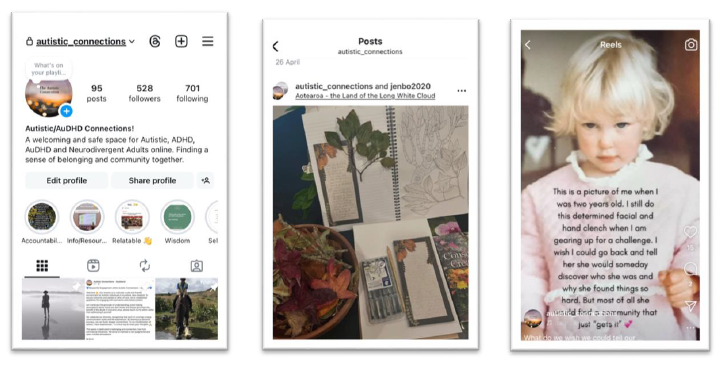
My account grew rapidly, reflecting my deepening understanding of Autism, ADHD, “AuDHD,” and neurodivergent identity. Initially, I encountered a myriad of memes and TikTok videos that offered only a glimpse into the diverse lived experiences of our community. I observed debates and disagreements in comment sections that echoed the “us and them” binaries, polarisation prevalent online and in real life, and the spread of misinformation. It became clear that some groups within the autistic community were underrepresented, while others gained substantial followings on Instagram.
I chose to keep the account private to navigate how my Autistic and ADHD identity was shaped by the messages I encountered and how to communicate my insights with those who followed my page. I aimed to create a safe space for diverse voices and ways of being and belonging—a space of “becoming together.” I reflected on how to respectfully engage with autistics of all support levels, acknowledging my late diagnosis and privilege as a white autistic and ADHder with low support needs.
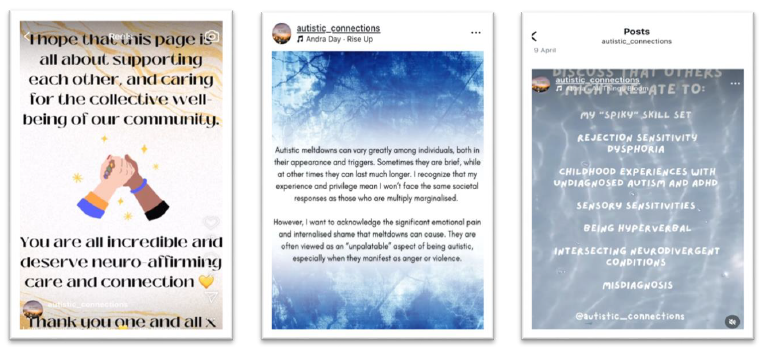
I sought to foster a positive, non-judgmental understanding of co-occurring conditions and mental illness while embracing the intersectional nature of my new community. I aimed to avoid perpetuating harm or ignorance by engaging supportively with an international audience's rich diversity of knowledge and experience. Advocates who shared their experiences of racism, gender diversity, and marginalisation demonstrated that belonging cannot come through further exclusion. As a newly diagnosed autistic “ADHDer”, I realised that true belonging required not just an understanding of disability rights but a commitment to promoting disability justice.
Disability Justice emerged in 2009 from a diverse group of disability activists who described it as “the cross-disability (sensory, intellectual, mental health/psychiatric, neurodiversity, physical/mobility, learning, etc.) framework that values access, selfdetermination, and an expectation of difference. An expectation of difference means that we expect differences in disability, identity, and culture. To be included and part of society is about being able to be our “whole self” (all of our identities together). Disability Justice includes space for self-care, reflection, and hard discussions. ( https://disabilityj.blogspot.com ).
I believe that Disability Justice offers a transformative perspective in advocacy for others and guidance for ourselves. It encourages us to look beyond our own experiences of autism or ADHD and seek solidarity in confronting the broader struggles, discrimination, and unfair treatment prevalent in a neurotypical society. Non-autistic individuals are not our adversaries; instead, it is the discourses, policies, and systems surrounding difference and disability that hinder inclusive change.
So rather than simply seeking to be seen and understood, my ongoing hope is for greater intersectional advocacy, enhanced communication (in whatever form that takes for each of us), and a deeper care, consideration, and acceptance of how we show up for one another in autistic, ADHD, neurodivergent, and mental health spaces online. My sense of belonging and self continues to flourish within an interdependent space founded on neuro-affirming approaches, uniting us as a community.
In conclusion, this succinct “think piece” invites the reader to reflect on how their experiences and insights shape their understanding of autism, ADHD, and the neurodiversity movement as a whole. How do we uplift one another and ourselves in ways that foster community, ensuring safety, open-mindedness, and a commitment to awareness, acceptance, and justice for all the diverse ways we interact and coexist on this beautiful yet complex blue planet?
Hide Your People, Chapter 1: Raid
Ames Blankley
Trigger warning: Painful overwhelm, distress of an autistic woman pre-identification, and violence and bigotry against neurodivergent people
The double doors crashed open. The chaos in the hallway was now in the customer service department.
Six agency thugs swept in, black-masked, yelling orders, kicking wastebaskets and chairs out of the way. Team members screamed. Angry shouts could be heard from the hallway. The doors smacked open again. Employees from other departments flooded in and mobbed the six officers, who pushed forward, deflecting all blows with the batons and riot shields they carried.
Their target was the empty desk in the furthest corner of the department. Four of the officers stood guard while the other two reached under the desk. Their masked faces were turned to the side as if to avoid blows from below. When they stood up again, it was with a struggling, screaming young woman suspended between them. The crowd followed the officers back through the doors, lying down to block the way. Grabbing at the riot shields. Throwing mugs, staplers, keyboards, anything.
And the government had given a special name to the mentally ill citizens they came to abduct: neurofrauds.
Six agency thugs swept in, black-masked, yelling orders, kicking wastebaskets and chairs out of the way. Team members screamed. Angry shouts could be heard from the hallway. The doors smacked open again. Employees from other departments flooded in and mobbed the six officers, who pushed forward, deflecting all blows with the batons and riot shields they carried.
Their target was the empty desk in the furthest corner of the department. Four of the officers stood guard while the other two reached under the desk. Their masked faces were turned to the side as if to avoid blows from below. When they stood up again, it was with a struggling, screaming young woman suspended between them. The crowd followed the officers back through the doors, lying down to block the way. Grabbing at the riot shields. Throwing mugs, staplers, keyboards, anything.
This was a raid.
And the government had given a special name to the mentally ill citizens they came to abduct: neurofrauds.
* * *
At the center of the mob, the department manager bit and screeched. She had ducked under the riot shields and thrown her arms around the waist of one of the two officers attempting to carry away her Social Media Customer Care Associate. The officer stumbled but kept going. Someone behind the manager grabbed her collar but she intensified her hold, trying to bite the officer’s side through Kevlar. Her left hand was clamped onto a strap on the officer’s back as her right scrabbled around his front and side, trying to find a hold.
Bang. An account rep slammed the outermost officer’s riot shield with a swivel chair. The two officers and the manager crashed to the left. The manager’s temple hit hard plastic. Her scrabbling right hand moved to the pistol, felt a strap release, jerked the weapon out of its holster.
But before she could imagine what on earth she would do with a gun, an enormous hand descended, grabbing it away. Arms from behind seized her torso and pulled. The officer she clung to shook his leg. The arms wrenched her left and right until she had to let go and was thrown her back into the crowd. The manager picked herself up, red-faced and shrieking, battling forward again to pummel the tailing officer’s shield with her bare hands.
The crowd crushed around her as she hit, kicked, yelled. And yet still, even in all this chaos, the adverse voice that lectured her every day, every minute, was still talking. You are so f***ed up, it said. You should be terrified. Why aren’t you? How could anyone not be terrified in this situation? What the f*** is wrong with you?
The manager’s body was talking to her, too. The noise in the hallway was a solid mass that paralyzed logic and freed the body to hit and kick. The blows of the batons were heavy, smarting, but her body surged towards them, every impact bringing release, as though it was busting a door down inside so that her fury could pour out. Maybe, said the adverse voice, this is what it’s like when the hatred outside you is bigger—for f***ing once—than the self-hatred you eat, sleep and breathe. And the fact that that makes you feel better is f***ed up.
The mob was in the stairwell now, pressing through the uproar. Shields were scraping against walls, railings rang at every baton strike. The manager could just see the top of Social Media’s head disappearing below as the officers turned a corner. The exit door was blocked by riot police with more batons, and the door was being pummeled from the other side by bodies seen through the wire-crossed gaps punched in the frosted glass. The f***ing raid was trashing their f***ing building.
Suddenly, the lobby. Roaring employees mixed with crazed protestors who’d swarmed the front doors. The security desk, sans security, was mobbed. A TV set slung just under the ceiling was still tuned to the news, the building shown in aerial view, the stream of bodies the manager was part of erupting from the doors and being immediately confronted by riot cops on either side of the walkway. At that moment, the manager herself was swept through the door into the blinding white sunlight. She shaded her eyes to scream curses up towards the low-flying news helicopter and its deafening blades.
The riot police were forcing the mob into a tighter, slower line. She could no longer see Social Media or the six black-dressed officers who’d dragged the young woman out from under her desk. The manager groaned and hit out at the shields to her right, then fell on her knees and crawled past the heavy stamping boots. She emerged on the other side just in time to see groups of officers shoving the employees they’d seized into a line of white vans. Rage pushed her towards them. Some of her coworkers had also breached the line of cops and were running in the same direction. The whiteness of the vans glared against the black-dressed officers, blackout windows, and the black cavities in the vans’ sides into which the officers pushed sales reps, account managers, customer experience associates, temps, IT, and apparently the rest of the whole f***ing neighborhood. Prisoners secure, the officers climbed in after them. Van doors slammed. Hoods shuddered and the vehicles began to move away.
The fastest runners had reached the convoy. They were slapping van windows and sides, sprinting in front, pounding on the hoods. Others threw rocks, litter, sticks, their shoes, their phones. The vans moved cautiously but always forward. Gangs of officers plunged into the street and wrestled, pushed, carried struggling bodies away. The line of vans gained speed.
The manager caught up to a side window and pressed her forehead to the blackout glass. In the shadow of her own face she was able to glimpse a scared, very young woman who wasn’t Social Media. She stumbled sideways and the van left her behind. Still she limped after the bumper, outraged justice spurring her on even as the sun, the noise, and her burning lungs and legs pressed her back.
Social Media. Also known as Ramona Oakley. The autism diagnosis had been two years ago, at least eighteen months before raids like this had even been thought of. But the diagnosis had taken the manager by complete surprise. And it was a major inconvenience even then.
To be clear, the whole department had always known Ramona was totally normal. She looked and acted fine. And she was certainly a spectacular employee. But suddenly, Ramona had needed a special desk in the corner. The ceiling light removed from that corner. Email-only communication. A more flexible schedule than anyone else’s.
HR insisted that Ramona’s productivity and even health depended on these changes.
At that point, the manager realized that HR was full of f***ing snowflakes gone crazy.
The manager had always fought through her own problems. And boy, she had problems. But the difference was, she wasn’t selfish. She wasn’t weak. She would never put her discomfort on other people. It wouldn’t be fair.
And now the department had been dragged through one of these horrific raids thanks to Ramona. Special Ramona and other neurofrauds like her.
The adverse voice had been listening to all this, and now it spoke again. But remember, it said. The raid wasn’t Ramona’s fault at all. The special desk was f***ing irritating. But isn’t everything in your life f***ing irritating? F***ing irritating doesn’t lead to a raid. Doesn’t lead to f***ing abduction. Why are you so f***ing cruel?
And why the f*** did you fight so hard back there?
Bang. An account rep slammed the outermost officer’s riot shield with a swivel chair. The two officers and the manager crashed to the left. The manager’s temple hit hard plastic. Her scrabbling right hand moved to the pistol, felt a strap release, jerked the weapon out of its holster.
But before she could imagine what on earth she would do with a gun, an enormous hand descended, grabbing it away. Arms from behind seized her torso and pulled. The officer she clung to shook his leg. The arms wrenched her left and right until she had to let go and was thrown her back into the crowd. The manager picked herself up, red-faced and shrieking, battling forward again to pummel the tailing officer’s shield with her bare hands.
The crowd crushed around her as she hit, kicked, yelled. And yet still, even in all this chaos, the adverse voice that lectured her every day, every minute, was still talking. You are so f***ed up, it said. You should be terrified. Why aren’t you? How could anyone not be terrified in this situation? What the f*** is wrong with you?
The manager’s body was talking to her, too. The noise in the hallway was a solid mass that paralyzed logic and freed the body to hit and kick. The blows of the batons were heavy, smarting, but her body surged towards them, every impact bringing release, as though it was busting a door down inside so that her fury could pour out. Maybe, said the adverse voice, this is what it’s like when the hatred outside you is bigger—for f***ing once—than the self-hatred you eat, sleep and breathe. And the fact that that makes you feel better is f***ed up.
The mob was in the stairwell now, pressing through the uproar. Shields were scraping against walls, railings rang at every baton strike. The manager could just see the top of Social Media’s head disappearing below as the officers turned a corner. The exit door was blocked by riot police with more batons, and the door was being pummeled from the other side by bodies seen through the wire-crossed gaps punched in the frosted glass. The f***ing raid was trashing their f***ing building.
Suddenly, the lobby. Roaring employees mixed with crazed protestors who’d swarmed the front doors. The security desk, sans security, was mobbed. A TV set slung just under the ceiling was still tuned to the news, the building shown in aerial view, the stream of bodies the manager was part of erupting from the doors and being immediately confronted by riot cops on either side of the walkway. At that moment, the manager herself was swept through the door into the blinding white sunlight. She shaded her eyes to scream curses up towards the low-flying news helicopter and its deafening blades.
The riot police were forcing the mob into a tighter, slower line. She could no longer see Social Media or the six black-dressed officers who’d dragged the young woman out from under her desk. The manager groaned and hit out at the shields to her right, then fell on her knees and crawled past the heavy stamping boots. She emerged on the other side just in time to see groups of officers shoving the employees they’d seized into a line of white vans. Rage pushed her towards them. Some of her coworkers had also breached the line of cops and were running in the same direction. The whiteness of the vans glared against the black-dressed officers, blackout windows, and the black cavities in the vans’ sides into which the officers pushed sales reps, account managers, customer experience associates, temps, IT, and apparently the rest of the whole f***ing neighborhood. Prisoners secure, the officers climbed in after them. Van doors slammed. Hoods shuddered and the vehicles began to move away.
The fastest runners had reached the convoy. They were slapping van windows and sides, sprinting in front, pounding on the hoods. Others threw rocks, litter, sticks, their shoes, their phones. The vans moved cautiously but always forward. Gangs of officers plunged into the street and wrestled, pushed, carried struggling bodies away. The line of vans gained speed.
The manager caught up to a side window and pressed her forehead to the blackout glass. In the shadow of her own face she was able to glimpse a scared, very young woman who wasn’t Social Media. She stumbled sideways and the van left her behind. Still she limped after the bumper, outraged justice spurring her on even as the sun, the noise, and her burning lungs and legs pressed her back.
Social Media. Also known as Ramona Oakley. The autism diagnosis had been two years ago, at least eighteen months before raids like this had even been thought of. But the diagnosis had taken the manager by complete surprise. And it was a major inconvenience even then.
To be clear, the whole department had always known Ramona was totally normal. She looked and acted fine. And she was certainly a spectacular employee. But suddenly, Ramona had needed a special desk in the corner. The ceiling light removed from that corner. Email-only communication. A more flexible schedule than anyone else’s.
HR insisted that Ramona’s productivity and even health depended on these changes.
At that point, the manager realized that HR was full of f***ing snowflakes gone crazy.
There was no other explanation. They had to be crazy. Because everyone has those problems. Everyone. And we can’t all have a special desk in a special corner for normal problems that everyone has.
And now the department had been dragged through one of these horrific raids thanks to Ramona. Special Ramona and other neurofrauds like her.
The adverse voice had been listening to all this, and now it spoke again. But remember, it said. The raid wasn’t Ramona’s fault at all. The special desk was f***ing irritating. But isn’t everything in your life f***ing irritating? F***ing irritating doesn’t lead to a raid. Doesn’t lead to f***ing abduction. Why are you so f***ing cruel?
And why the f*** did you fight so hard back there?
* * *
The line of vans was no longer visible. The manager let her heavy legs pull her to a stop. Tears started to well and she squeezed her eyes to keep them in. The rage was draining out, and in its place rose something so, so much worse: The Pain. The panic in the belly, the nails in the neck and shoulders, the brain screaming and screaming.
And so, as on every other day she could remember, her thoughts, her emotions, her whole being turned inward towards the biggest battle of her life: defending the wall she’d raised to keep that kind of screaming from ever, ever, ever coming out.
Ahead of her, other runners dropped to their knees, lay in the road, stood swaying, still calling hoarsely after the vans. Some continued to stagger forward.
A new wave of shouts behind her made her turn. A halfhearted battle was rising between groups of city police and any protesters who were still standing.
More sirens sounded up the road. She turned again in time to see two officers walking in her direction, eyes locked on hers, closing in.
Getting to Know: Studio 606
Val Flynn
https://studio606.art I opened Studio 606 just over two years ago with the goal of selling my own pottery alongside work by other local artists. I was ready for a change after doing markets, where I often sold very little. Once my husband finished building my pottery studio—connected to the shop—we decided to convert our small one-car garage into a storefront. Since our home is in a commercial district, all we needed was a permit.
We live on the Main Street of our town, though we’re about a block past the main cluster of shops. Foot traffic can be slow, especially when the weather’s bad. Living in the rainy Pacific Northwest, that means I often have plenty of time to work in the studio while the shop is open. The summer months bring more activity, as people are more willing to wander a little farther out of the main stretch.
And while I look forward to interruptions—they’re the reason I’m here—they can still be a challenge.
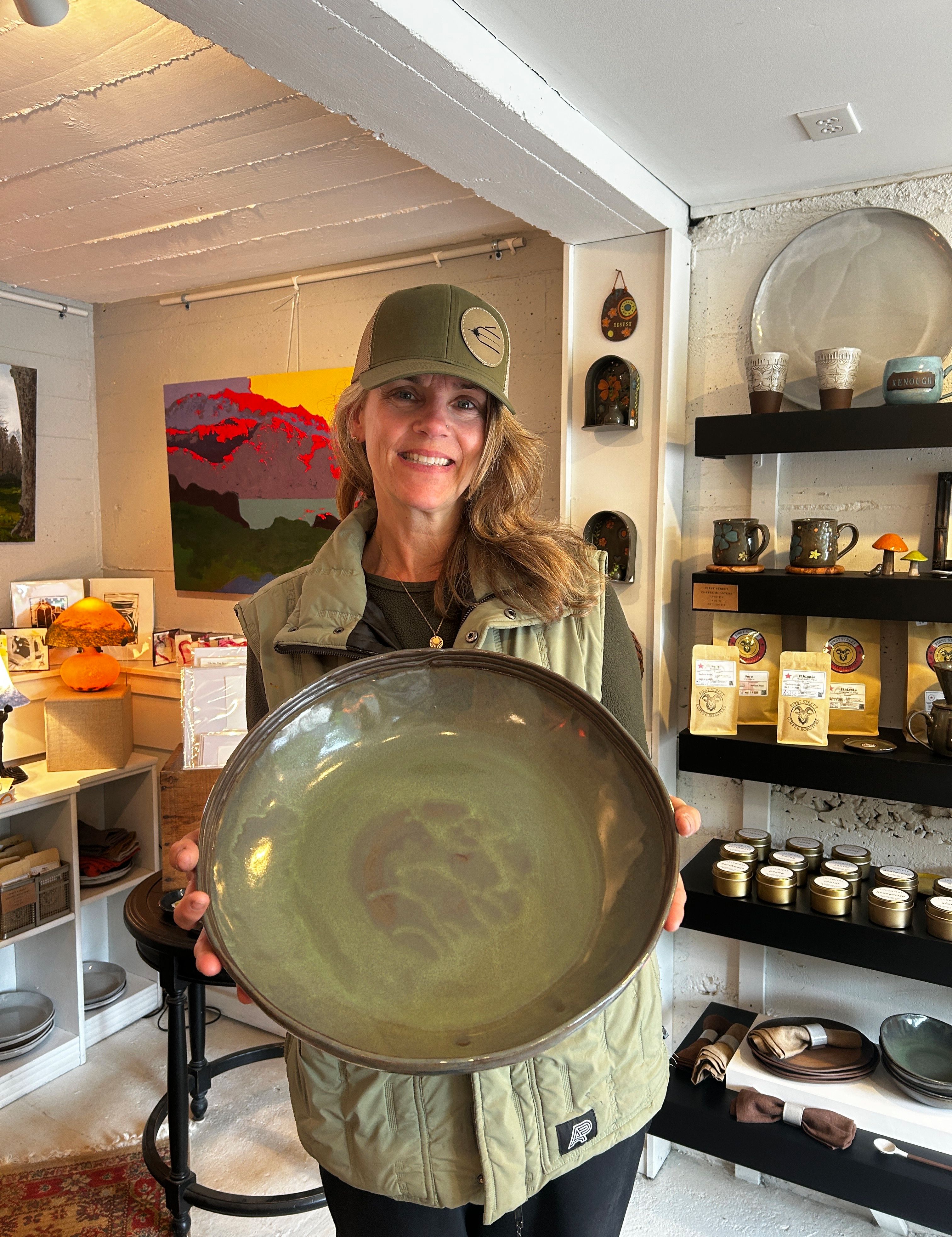
A customer with her new bowl
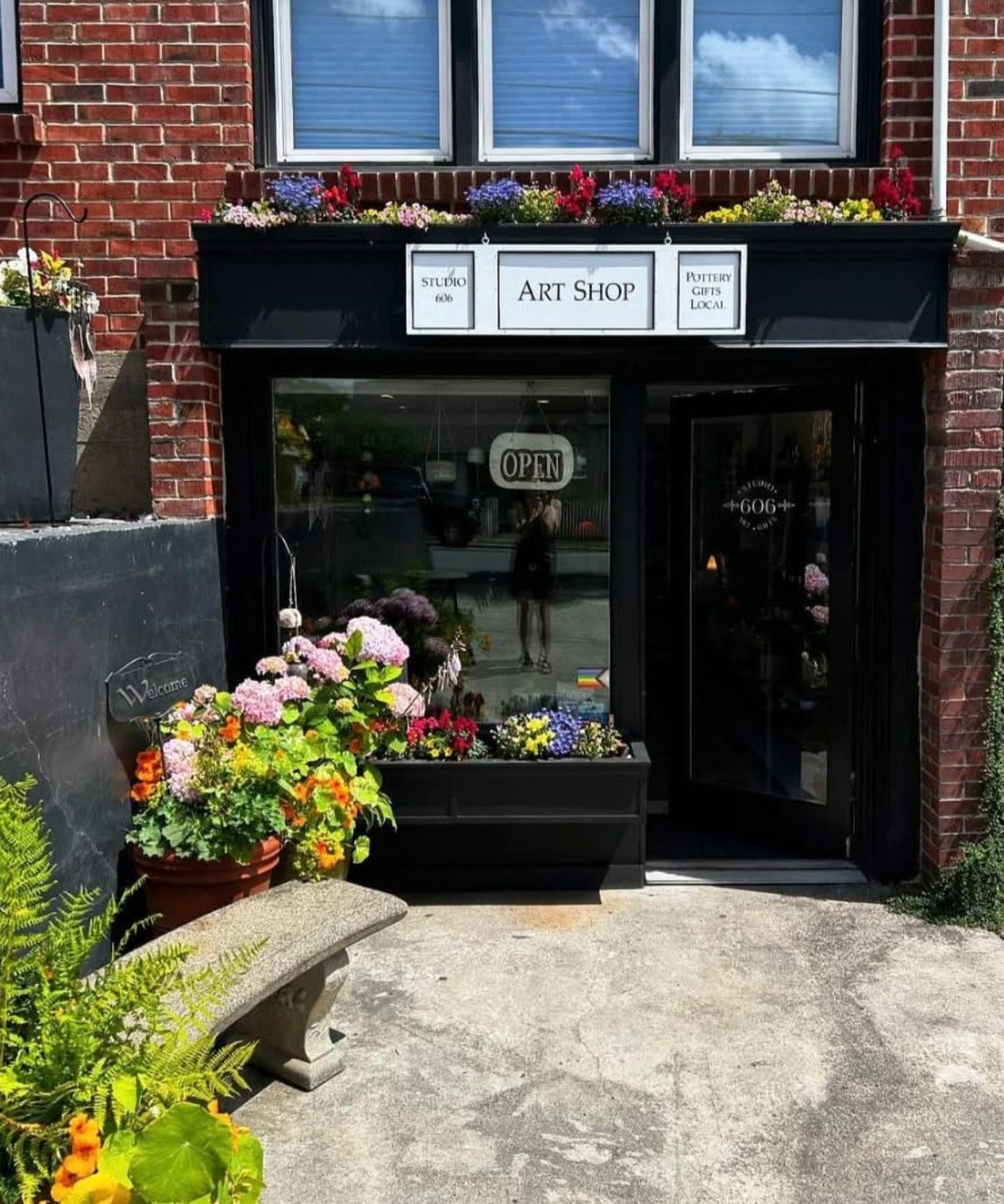
Studio 606
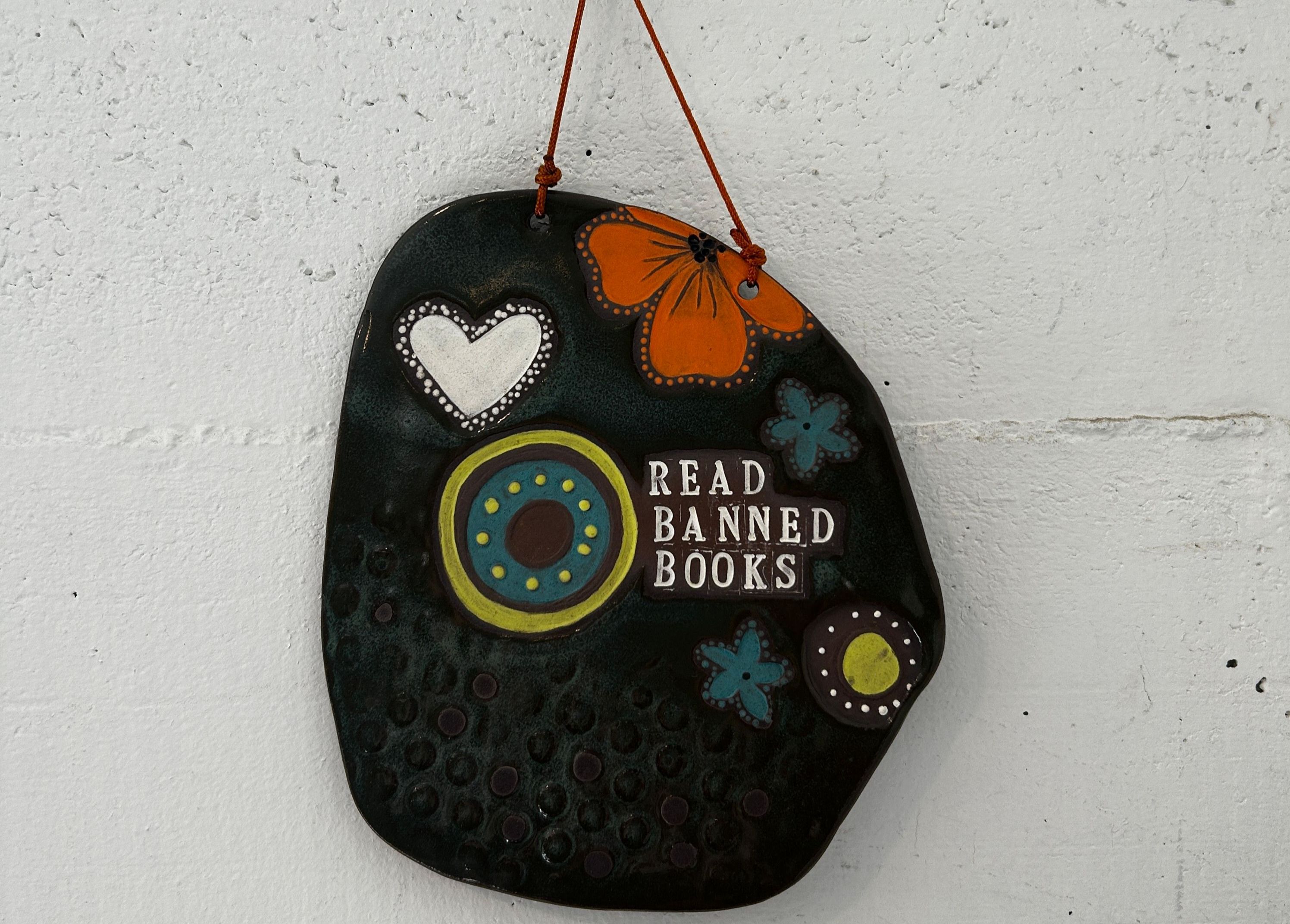
A “Read Banned Books” plaque that I made when I cut my finger a few months ago
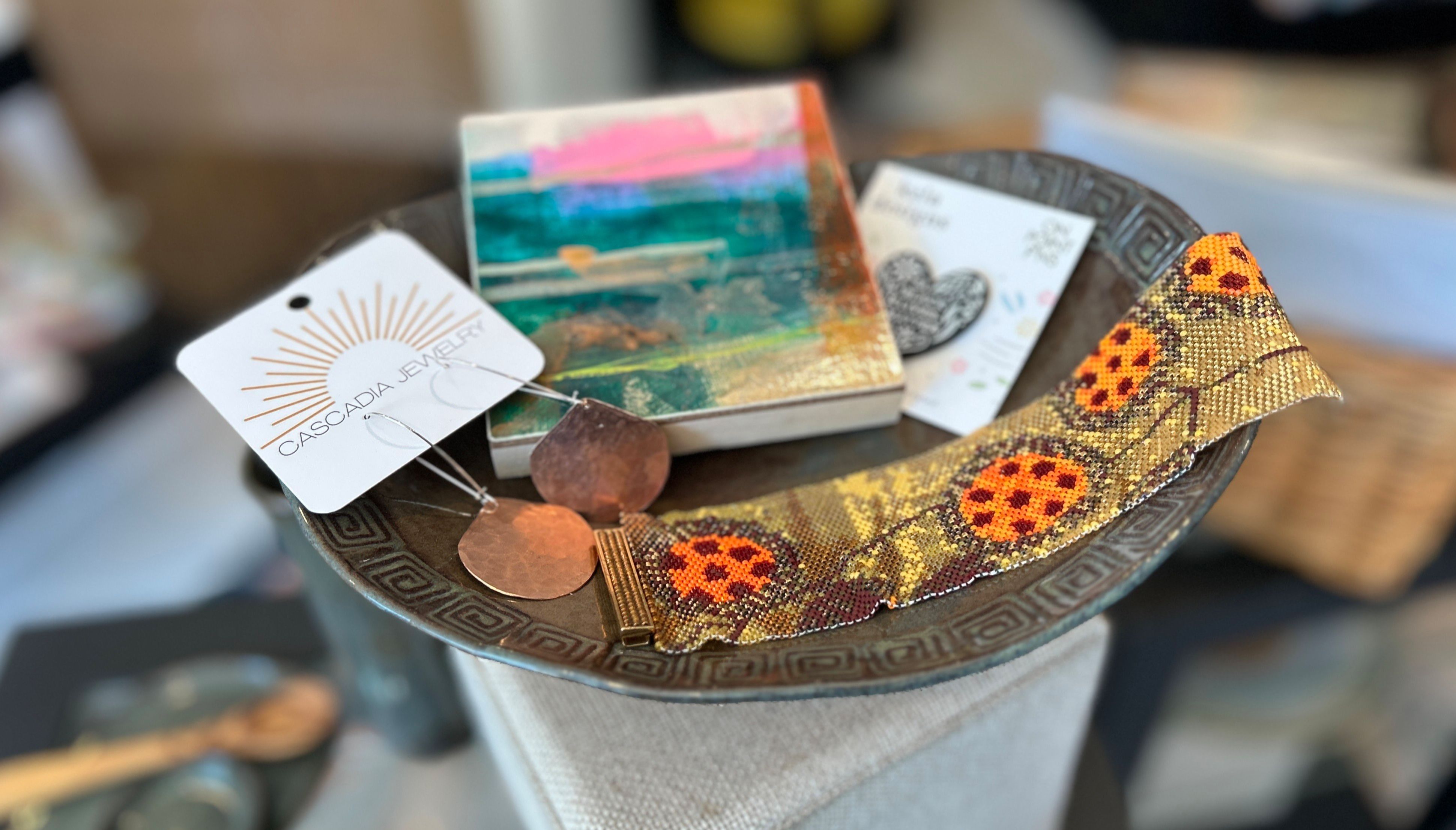
A few items from around the shop, including a beaded bracelet and tiny abstract painting
Snippets of Autistic Life – Neuropsych Testing
I arrive at the hospital a bit stressed because I am just right on time. As I look for the right place, I breathlessly ask a middle-aged receptionist. “Oh, you need the outpatients building,” he says, “it’s right and then right”. Did he mean I need to go right and then the building is on the right? Or that I should turn right twice? Language always feels like a guessing game. Especially the English one. I was diagnosed with Auditory Processing Disorder a few months ago, which means that my brain turns English into gibberish. This whole nation might as well be made of minions. It’s an issue.
They tell me to sit down and wait for my doctor to come and fetch me. It's reassuring. The seats have bland, tasteless colors that soothe my eyes. I don’t like bright colours, they feel like a punch to my grey matter. It’s not a matter of aesthetics, just survival. My friend got married in a bar in North London that is literally covered in bright pink neon lights last year. I attended because I love her. But when I saw the pictures of the place on Google beforehand, I felt a wave of dread. I brought sunglasses. I’m way past caring about being judged for this kind of stuff. Still, I care a little. When I arrived, to my surprise, they gave heart-shaped sunglasses to every guest as a wedding souvenir. “Great”, I thought, “now I can blend in with the crowd. One less thing to justify for me”. The wedding was good. I ended up shutting down on a sofa halfway through, though. I’ve done that since I was a teenager: I put on my invisibility cloak, collapse on sofas in the middle of parties for 30-45 minutes, then get up and act like nothing happened. It’s a magical disappearing and reappearing act. An art to be mastered. In between the two parts of the magic trick, I actually lose brain function, but that is not relevant to the public.
It's a nice hospital. Old building – orange bricks and white decorations on the outside. Old English buildings are all made of bricks. This is a brick nation. I come from a different architecture, but then I guess I moved precisely in order to feel foreign. I close my eyes and drift off instantly into a state of semi sleep. I am always just half a step away from oblivion. I live exhausted. I live on the edge. The doctor materializes and calls my name. She is a reassuring person with a bob haircut. She speaks clearly, but not condescendingly, and I love that. I am allergic to condescension. I like her immediately. She is one of those people that basically live in their pajamas, but without fully realizing it. She has unassuming black soft trousers and a soft cheap shirt with some bee print or something. She definitely chose the right profession, she is just effortlessly good at it. I can imagine her in any context of life in her semi pajamas - partying on a boat, doing a puzzle, and administering neuropsychological testing, all with the same bees shirt from Primark.
“Are you comfortable doing the stairs?” she asks. I have been in this country for 6 years, and I am still taken aback by this kind of questions. Where I am from, no one comes to guide you, and maybe the lift is broken, and you need to walk all the way to the back one, but no one tells you. They definitely don’t ask you if you are okay doing the stairs. Actually where I am from, I wouldn’t have been accepted for neuropsychological testing at all. I’m just an anxious young woman there (I’m not a woman, I’m nonbinary, but that doesn’t exist where I’m from). She guides me up the stairs. I ask her for some water, she kindly goes fetching some and she comes back with a cup. There are unknown black little things floating all over the water surface. I wonder if they come from her semi-pajamas. I drink anyway, thankful they are not mosquitoes.
She asks me some general questions about why I am struggling with my cerebral functions, then we move on to testing. I explain to her the sorry state of my post-burnout neurons. Memory, concentration, executive function, and everything. She actually listens and seems to understand, which is great. The testing is almost fun. She tells me some stories, asks me to repeat, asks me to remember geometrical shapes and draw them again. I do surprisingly well with that one, I actually thought my visual memory was shot. I reply to her questions in between sips from the dirty cup. I end up drinking the floating guys. I wouldn’t have done that in the past, but since burnout I have frankly stopped caring about a lot of things. I need to drink because speaking always makes my throat really dry. It’s one of the myriad of tiny differences I notice between my body and other people’s. My body does weird things, in an almost imperceptible, yet relentless way. Two of my toes are linked together like a mutant frog. When everyone is warm, I am freezing. My eyelashes are short and straight, my eyes too close to each other. I physically can’t raise my voice. I worked in a sandwich stand at a medieval festival in a mountain village once. I couldn’t announce the sandwiches over the damn medieval accordion, so my boss had to do that for me. I’m sure I have some altered genes somewhere, but it is what it is.
I don't think I fare badly at the testing overall. I realize that I am ridiculously sensitive to the doctor’s reactions to my performance. I feel like I'm in school again. Every time she says "okay, good" I feel reassured. This childish search for praise makes me a bit annoyed at myself, but it’s also funny. I wish I wasn't such a simple creature. I wish getting things right was not this important to me. It isn’t, in principle, but when you generally feel like you exist wrong, any relief is welcome. I am mildly scared that the results will tell me that I am really dumb. The final truth about my brain, after a childhood of constantly getting comments on my “intelligence”, and an adulthood of constantly screwing up. But at this point, I don't actually feel like the results will say a lot about me as a person. It's more of a means to an end - having proof of the things I struggle with, having proof of the things my brain can actually do. I just want to understand my profile better, and move forward. Find some work that I can actually do, reshape my life to fit whatever spiky origami my skill profile is, and find some stability. I never wanted stability, but now I do.
The bees-wearing doctor tells me that I need to come back another day for the second part of the testing. I resist the temptation to ask her how I’ve done the first half. I always need to know things, it’s almost compulsive. Let it be(e). I come home to find one of my flatmates in the kitchen. “What have you been up to?” they ask. “I just went for a coffee”, I reply.
Bathrobe Comics: Bathrooms
Sarah Jane Cody
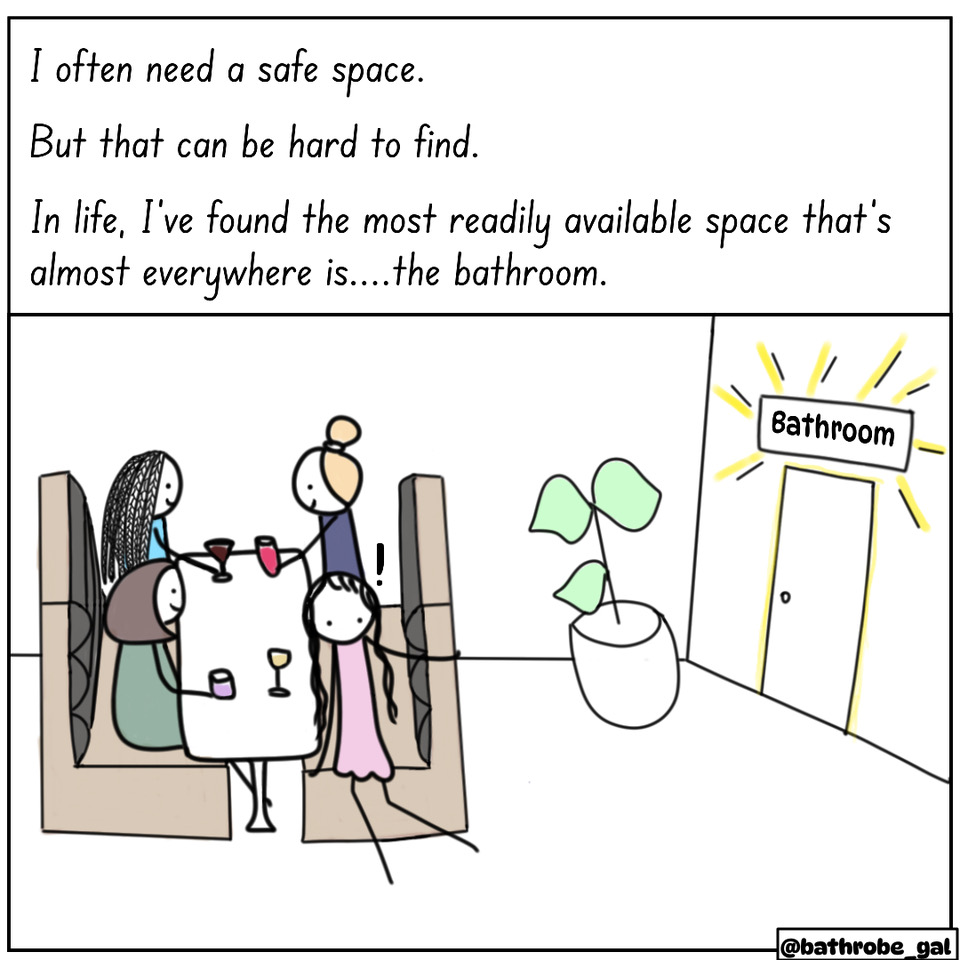
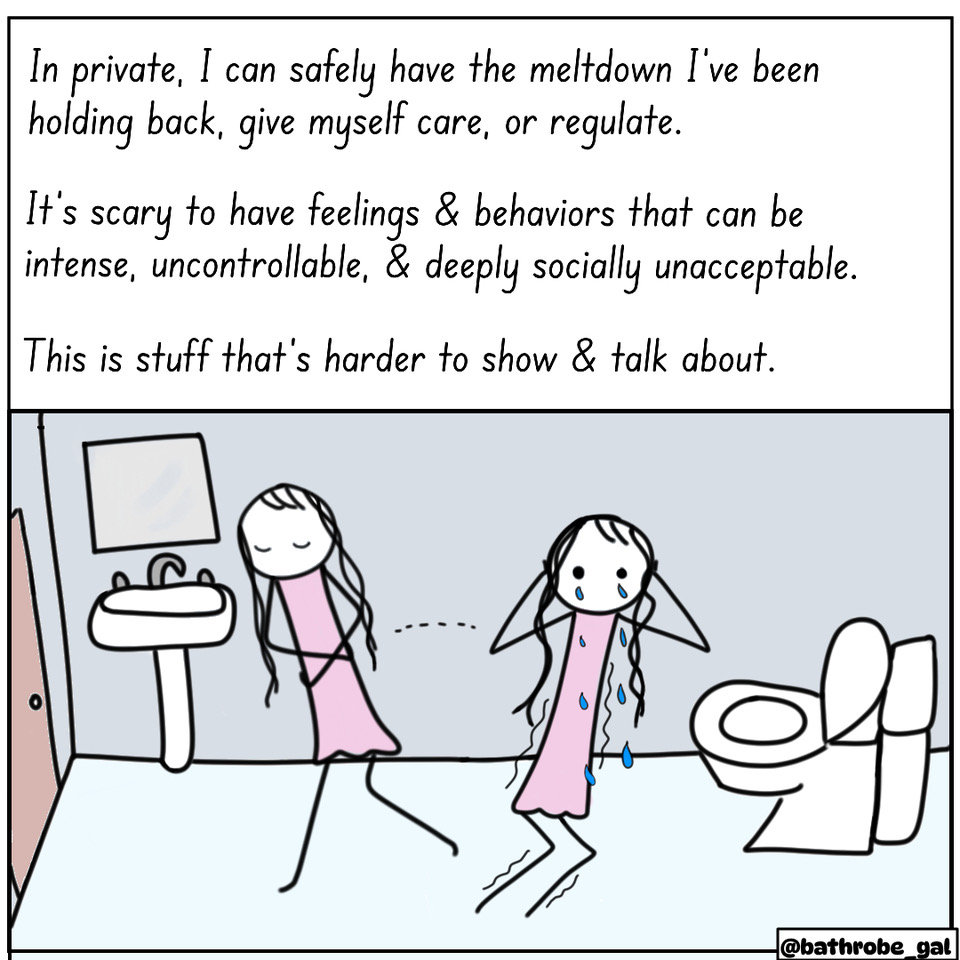
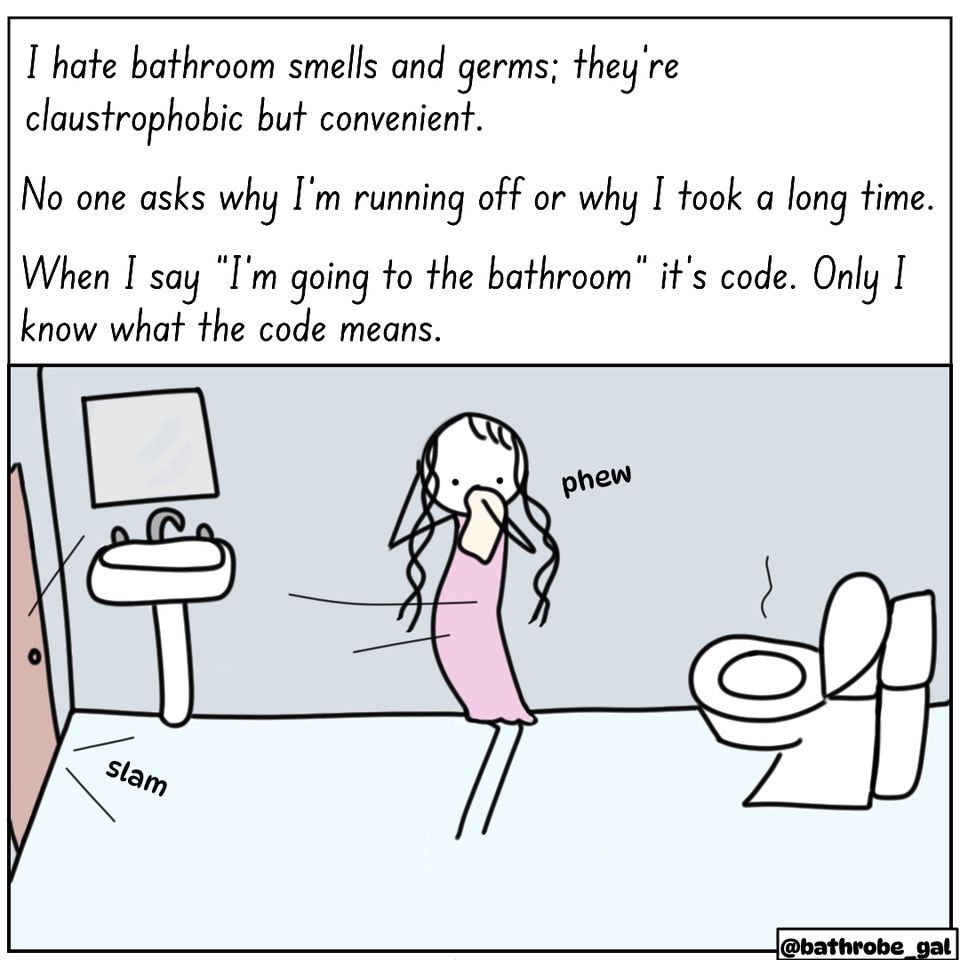
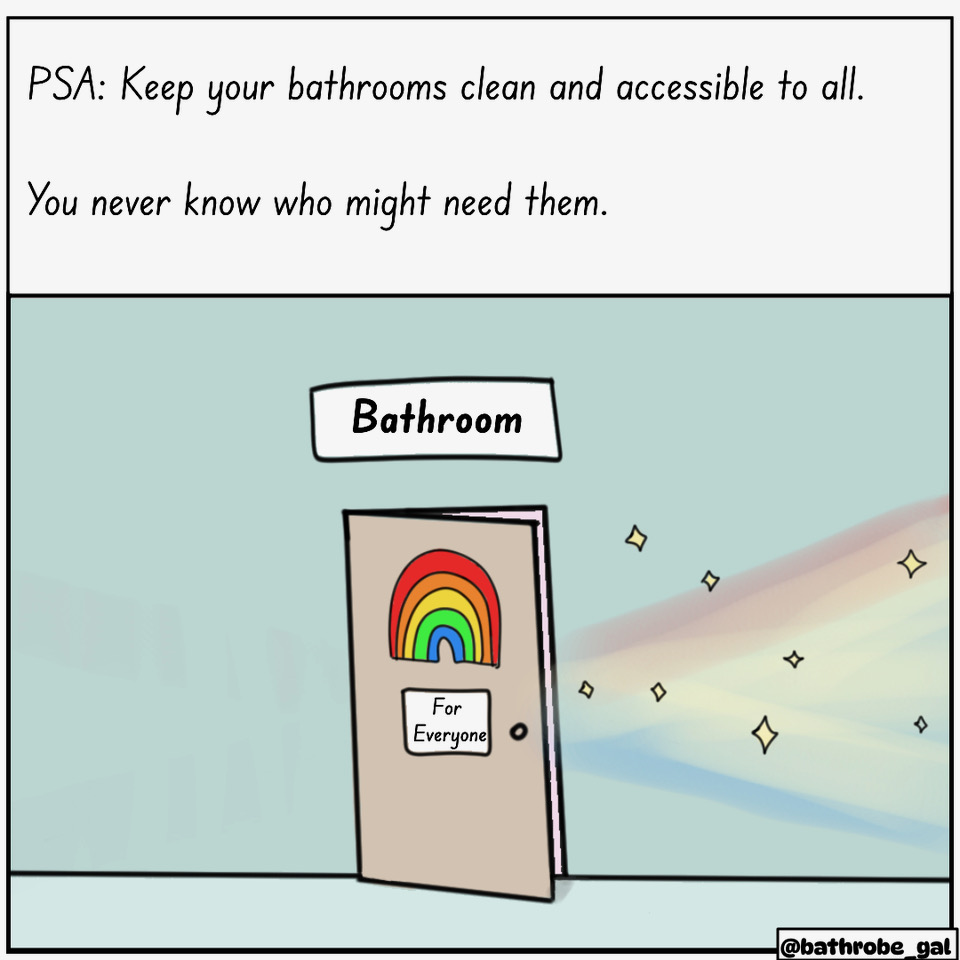
Sticker: Feel Your Feelings
Elissa Fox
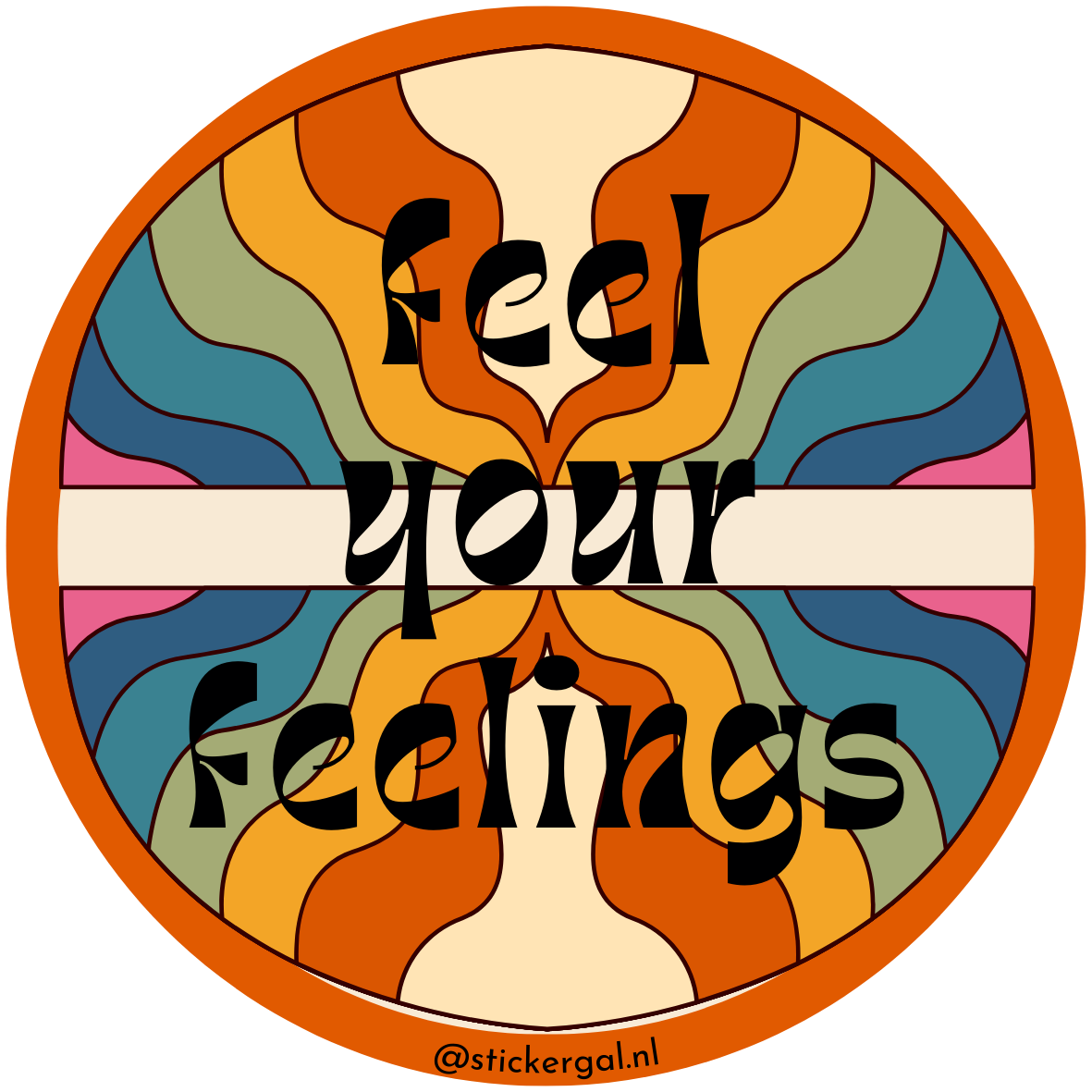
Classifieds
Please use caution when communicating outside AWG meetings
🤝👥🧠 Looking for Local Friendship in Southern California 😎🌴
Hi! I’m Renee, in Southern California, and I'm looking to build local friendships. I love this virtual community and am also hoping to find nearby connections open to sharing local life now and then, whether it’s for support or fun.
I’m not expecting anything instant or guaranteed, but I'm hoping to meet folks who value authenticity, consistency, and mutual care.
I may come across as reserved in group settings at first—usually because I’m taking in a lot of input and processing—but once I feel comfortable, I’m silly, affectionate, and playful.
If that resonates with you and you're local to Southern California, I’d love to hear from you.
📩 DM me on IG at my side project page: https://www.instagram.com/amotioncaptured/
📩 Not on IG? Email me at theneonlamb [at] protonmail [dot] com. This isn’t my primary email address, which I don’t share publicly for privacy reasons, so thanks for your patience if it takes a bit longer to get back to you.
I’m happy to discuss shifting to another form of communication once we’ve connected.
I’m not expecting anything instant or guaranteed, but I'm hoping to meet folks who value authenticity, consistency, and mutual care.
I may come across as reserved in group settings at first—usually because I’m taking in a lot of input and processing—but once I feel comfortable, I’m silly, affectionate, and playful.
I live with chronic health conditions and am exploring neurodivergence, so I especially appreciate friendships that honor pacing, access needs, and clear communication.
📩 DM me on IG at my side project page: https://www.instagram.com/amotioncaptured/
📩 Not on IG? Email me at theneonlamb [at] protonmail [dot] com. This isn’t my primary email address, which I don’t share publicly for privacy reasons, so thanks for your patience if it takes a bit longer to get back to you.
I’m happy to discuss shifting to another form of communication once we’ve connected.
